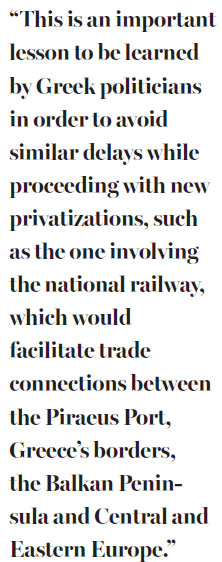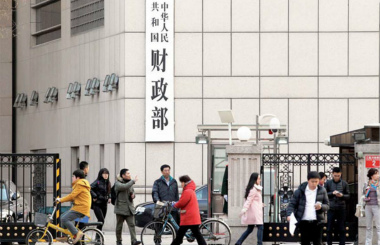Piraeus price lower than under normal circumstances
Updated: 2016-04-15 08:52
By GeorgeN. Tzopoulos(China Daily Europe)
|
|||||||||
But the deal can create new opportunities for recovery and the strengthening of Greece geopolitically and strategically
Since the outbreak of the Greek economic crisis in October 2009, China has been perceived by some Greek politicians and a significant part of the public opinion as a potential savior. The perceived ability of Beijing to grant a bilateral loan to Athens generated the illusion - especially in the first six months of 2015 - that the rescue package provided by the European Commission, the European Central Bank and the International Monetary Fund was not the only alternative.
Greek Vice-President Ioannis Dragasakis has said that his Syriza Party government unsuccessfully attempted to raise a loan in third countries like China before the so-called "Agreekment" of July 12, 2015. Former Finance Minister Yanis Varoufakis goes even further, suggesting that a phone call from Berlin blocked a possible Sino-Greek financing deal.
The reality is that as a matter of principle, the Chinese government would hardly have been prepared to unilaterally intervene in the Greek crisis and jeopardize the good status of its relations with the European Union and countries such as Germany.

In that regard, it never commented on bilateral loan scenarios but focused on the need for Greece to stay in the eurozone and emphasized its will to continue investments, which began with operations at piers II and III of Piraeus Port in 2009.
When Greece decided to sell the remaining part of the port, the Piraeus Port Authority, Cosco - now China Cosco Shipping - expressed its interest from the very start. Showing patience for more than two years it finally submitted its offer in January 2016 and will buy a 51 percent stake at a first stage and 16 percent at a later one. The content of the concession agreement has not yet been finalized. The privatization, however, has entered its final stage in spite of reactions from port trade unions and ideological opposition by some Syriza Party members.
The amount of 368.5 million euros ($415 million) to be paid by the Chinese company only seems sufficient when taking into account the ongoing financial crisis and the Greek stock market's continuous fall. It is certainly a much lower price than the real value of the Piraeus Port Authority under normal circumstances.
If this privatization had taken place earlier, economic benefits for the Greek state would have been much higher. This is an important lesson to be learned by Greek politicians in order to avoid similar delays while proceeding with new privatizations, such as the one involving the national railway, which would facilitate trade connections between the Piraeus Port, Greece's borders, the Balkan Peninsula and Central and Eastern Europe.

Within this context, the recent Sino-Greek deal goes beyond the price of a typical business transaction for three main reasons.
First, Cosco has agreed to invest more in the Piraeus Port and surrounding areas in coming years.
Second, the agreement will transform Piraeus into a bigger transshipment hub, boosting trade, attracting new domestic and foreign investors and strengthening the geopolitical and strategic importance of Greece.
And third, this deal can pave the way for a critical improvement of Sino-Greek and Sino-European relations should labor conditions be respected and relevant terms applied. Greek Premier Alexis Tsipras is due to make an official visit to Beijing on the invitation of his Chinese counterpart Li Keqiang.
The development of close relations between Greece and China has created some skepticism in Western circles regarding potential geopolitical implications. That is because the latter has the opportunity to access Europe via the former by obtaining control of critical infrastructure and implementing its Belt and Road Initiative in a rather straightforward way.
Nevertheless, even when it comes to the geopolitical consequences of having close relations with China, Greece does not consider its position as fundamentally different from that of other European Union states
Perspectives for the future are positive. China might not be a savior of Greece but it can certainly contribute to the country's growth via its new Silk Road. The ongoing crisis cannot be overcome with easy solutions. But it can create new, unprecedented opportunities paving the way for a "Grecovery".
The author is a lecturer at the European University in Nice. The views do not necessarily reflect those of China Daily.
(China Daily European Weekly 04/15/2016 page9)
Today's Top News
World Bank joins AIIB on financing for joint projects
GM seeds to get oversight
Russia-China ties benefit both countries, peoples
China, UK showcase best books in London
Hello, China! Stephen Hawking debuts Weibo account
Manila set to restart revamp of airport in S China Sea
Forget cabs, now you can book plane through apps
Britain and China must join to solve steel crisis, ambassador says
Hot Topics
Lunar probe , China growth forecasts, Emission rules get tougher, China seen through 'colored lens', International board,
Editor's Picks

|

|

|

|

|

|







